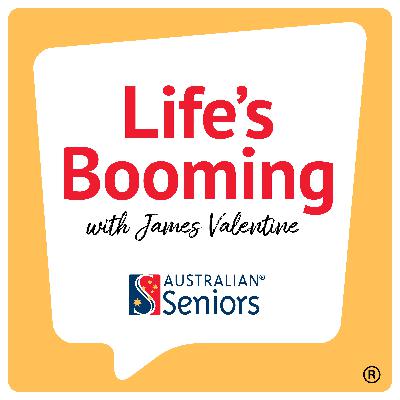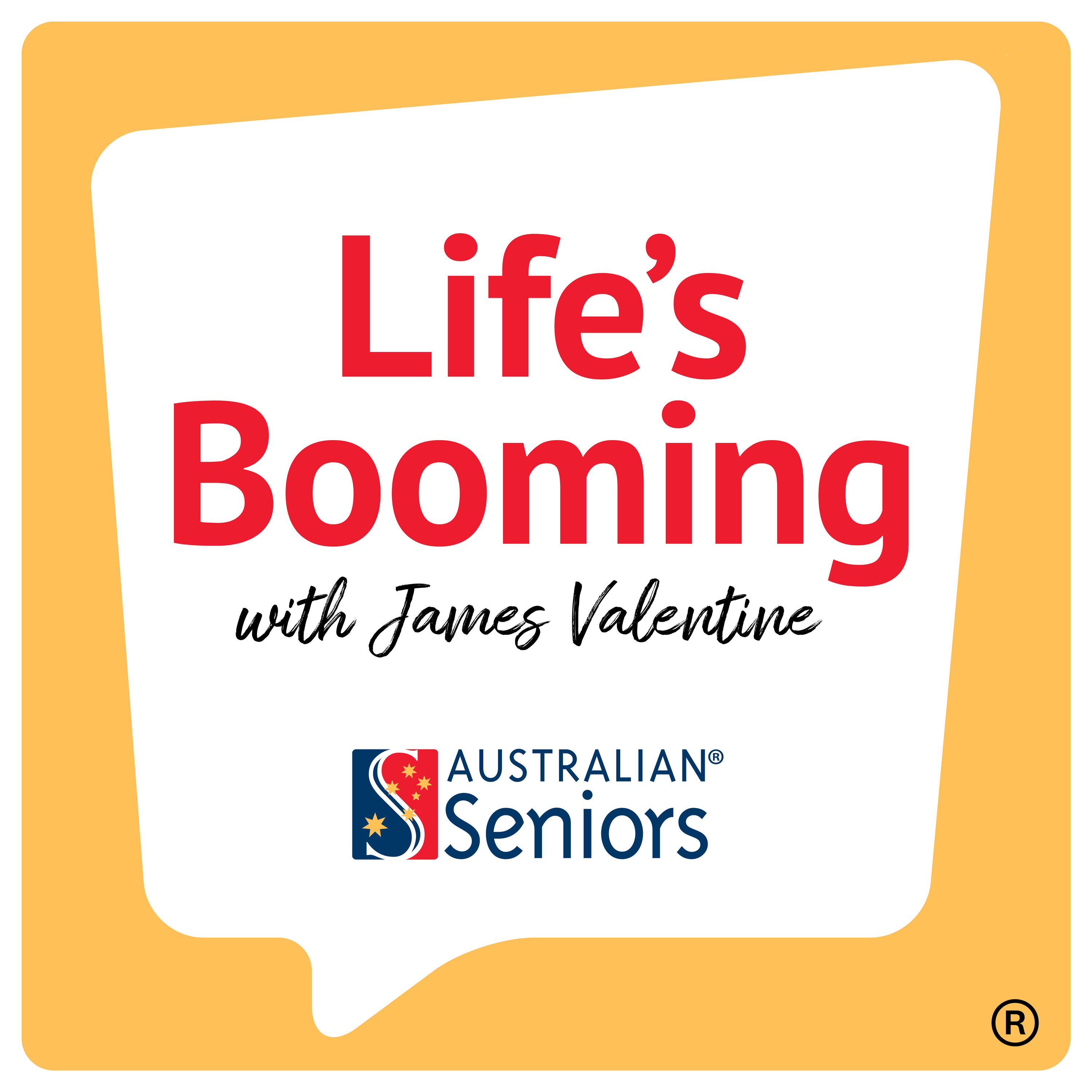Let's talk about death, baby - with Andrew Denton & Kerrie Noonan
Description
Let’s talk about death, baby
From breaking the stigma to understanding the conversations we need to have before we die, beloved broadcaster and advocate Andrew Denton and clinical psychologist Dr Kerrie Noonan dissect everything we should and shouldn’t say about death.
About the episode – brought to you by Australian Seniors.
Join James Valentine for the sixth season of Life’s Booming: Dying to Know, our most unflinching yet. We’ll have the conversations that are hardest to have, ask the questions that are easy to ignore, and hear stories that will make you think differently about the one thing we’re all guaranteed to experience: Death.
Featuring interviews with famous faces as well as experts in the space, we uncover what they know about what we can expect. There are hard truths, surprising discoveries, tears and even laughs. Nothing about death is off the table.
Andrew Denton is renowned as a producer, comedian and Gold Logie-nominated TV presenter, but for the past decade he has been devoted to a very personal cause. He is the founder of Go Gentle Australia, a charity advocating for better end of life choices that was instrumental in passing voluntary assisted dying (VAD) laws across Australia.
Senior clinical psychologist Dr Kerrie Noonan is director of the Death Literacy Institute; director of research, Western NSW Local Health District; and adjunct Associate Professor, Public Health Palliative Care Unit, La Trobe University. For the past 25 years she has been working to create a more death literate society, one where people and communities have the practical know-how needed to plan well and respond to dying, death and grief.
If you have any thoughts or questions and want to share your story to Life’s Booming, send us a voice note – lifesbooming@seniors.com.au
Watch Life’s Booming on YouTube
Listen to Life's Booming on Apple Podcasts
Listen to Life's Booming on Spotify
For more information visit seniors.com.au/podcast
Produced by Medium Rare Content Agency, in conjunction with Ampel
--
Disclaimer: Please be advised that this episode contains discussions about death, which may be triggering or upsetting for some listeners. Listener discretion is advised.
If you are struggling with the loss of a loved one, please know that you are not alone and there are resources available. For additional support please contact Lifeline on 131 114 or Beyond Blue on 1300 224 636.
TRANSCRIPT:
James: Hello, and welcome to Life's Booming. I'm James Valentine, and this season, we're talking about death. Or, on this episode, why we don't talk about it enough. Death is really easy to talk about, but avoiding the subject just makes things even harder. From breaking the stigma to understanding the conversations we must have before we die, I'll be dissecting everything we should and shouldn't say about death with two fascinating minds.
Andrew Denton is the founder of Go Gentle Australia. A charity advocating for better end of life choices, but you probably know him better from so many shows on our TV. And Dr Kerrie Noonan is a senior clinical psychologist and social researcher, determined to increase our death literacy. Kerrie, Andrew, thanks so much for joining us.
Do you know one another?
Andrew: Yes we do. Yeah.
Kerrie: Yeah, along the way.
Andrew: We've had a few conversations about death, dying, literacy, all those things. Yeah.
James: How did you learn about death? Like when did you, and who did you go to talk to? When did you start thinking about it?
Andrew: Well, I think you learn about death the way everybody does, which is you experience it.
And the first time it happened to me, I made a documentary about teenagers with cancer, Canteen, the support group, and one of those young men died. And his parents very generously invited me to visit him as he was dying. And that was the first time I actually saw what death can be. And it was, it was very hard to see and then watching my own father die obviously was a profound moment for me because that was an unhappy death.
But how I've learned about it since is, I imagine a bit like Kerrie. I've had thousands of hours of conversations with people who are dying and their families and their carers. And, I've learned so much about death I feel I've mastered it and can move on.
James: Yeah, true. That's right. Is that, is this what you mean by death literacy, that, that in some ways we just need to be talking about it more?
Kerrie: It's, it's talking about it. That, that's one aspect. But it's, it's kind of developing your know-how and being able to put that know-how into practice. So, you can maybe talk about, maybe have some competency in terms of talking or maybe doing one element, related to death and dying. But, when you put it into practice, that's when death literacy kind of really comes to life.
It kind of sits, some of the research we've done recently, it's evident that death literacy sits in networks, in-between people, within people, in communities, so it's not just about individuals.
James: I suppose I'm wondering about at what point we might have this, or there'd be a difference in death literacy with 20-year-olds than there would be with 80-year-olds, right?
Kerrie: Yes, experience changes your death literacy. That's probably the strongest predictor. So we started this research looking at networks of care and how people kind of come together. And so where we're at now is we're looking at what are the predictors and what are the things that we understand so that we can understand more about how to make more death literacy, I guess.
So an example, that's your question, well I can give a real example. When my mum was in hospital, we were, we needed someone to help us to move mum from the hospital to home because we wanted to take her home. And we couldn't get the health system or the medical system to do that. So I put an email out, a text message out to my friends who happened to work in the death space.
And within an hour we had someone, within two hours, mum was home. And so. That took, you know, that set off a little chain of conversations, emails, texts. And while I was doing that, my brother was getting the medication sorted and other things sorted for my mum. So we really, we utilised, to bring my mum home, we utilised like every bit of knowledge and our networks to do that.
James: But you were at the centre of, you know, you, you study this, you're a, you know, an advocate for it, and so you're at the centre of it. You would have a network. I mean, I don't know that I've got the same network. I'd, I could put it out to my friends and they'd go, we could bring wine. Oh, you know, like, I don't know that they'd, I don't know that they'd be that practical.
Kerrie: But that's actually helpful too. You need your friends to turn up with wine and, and bread and whatever comforts. So we found that younger people, for example, so we've done two kind of national studies just to kind of demonstrate your point about younger people. Between, 2019, pre COVID, and 2023, we looked at the population and we looked at death literacy and how it changed.
And we found that voluntary assisted dying and COVID had an impact on people's death literacy, particularly for the younger people, anyone who's experienced a death, anyone who's been through loss, has higher death literacy than people who haven't. And so, there's lots of things that contribute to that, but, COVID, I think, we're still kind of looking at the data, but certainly voluntary assisted dying because of the way that you need to kind of have conversations, you need to actually reach out to your networks, you need to talk to doctors, you know, there are actually lots of interactions in that that really stretch your skills and, your understanding.
James: It's only a few generations back when death was very present in our life. The conversation about voluntary assisted dying has perhaps allowed us to have that conversation again. Have you seen that?
Andrew: Yeah, I think that's right. I mean, there's, there's a lovely, witty observation that in Victorian times they talked about death all the time and never about sex.
And today it's the other way around. It's not that many generations ago where the body would lie in the house and there'd be a viewing in the house. And so it was, it was a more human thing, the way Kerrie's describing her friends helping her mother come home, that's a communal






